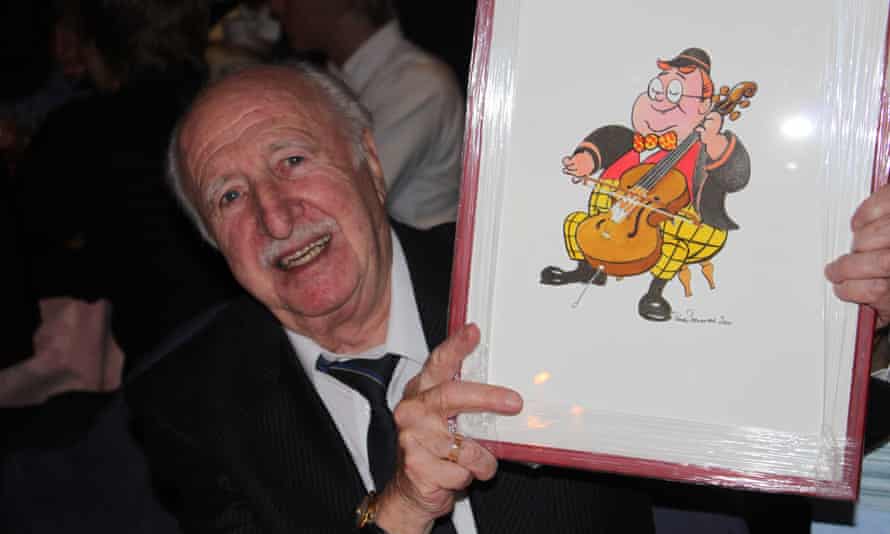61 years a cellist in London orchestras
RIPThe Guardian has a fine obit of Sidney Denbin, who has died aged 100.
… Sidney joined the BBC Symphony Orchestra in 1948, changing his surname to Denbin, and went on to have a remarkable career. He travelled the world, playing in New York and Beijing as well as mainland Europe. A fixture at the Proms, he played under the baton of Sir Adrian Boult, Sir Malcolm Sargent, Rudolf Schwarz and many others. He befriended Pierre Boulez when the French conductor first came to London (Boulez remembered this kindness in a 90th birthday message). He also played with the Philharmonia and English National Opera, finally retiring at 82.
Read on here.






I imagine it’s greatly an issue with the halls, but I’d like to know why I have so much trouble hearing the cellos and double basses in recordings made with any of London’s five major orchestras. Especially the double the basses. Very bass thin, often times.
Nothing to do with the halls, unless you are possibly there. All to do with sound engineers and what they choose collaborately to release.
I have noticed the same thing, but there are certainly exceptions (going all the way back to Toscanini’s BBC Symphony 78s) and it varied by record label more than it did by orchestra.
The recording venues might play a role now and then, and I agree with Maria that the sound engineers are likely a major factor as well. When I became a record reviewer I was quietly advised by a new colleague that I’d better re equip my sound system with B&W speakers. Why? Because that was, at the time, the preferred studio monitor of the English record producers and if a reviewer wanted to make negative comments about the recorded sound, if they didn’t use B&Ws they’d be opening themselves up to snippy attacks from the record producers along the lines of “well of course if you’re going to listen to our wonderful recoding with THOSE speakers of course it won’t sound as good as it could” and so on. Such snipper letters from record producers were pretty common fodder in Fanfare’s Letters section.
So I got B&Ws, never totally liked them, but did note that they had very restrained bass response. (The down side is that sometimes to keep my neighbors happy I had to do my late night review listening over headphones and often had entirely different reactions to recordings when I did.) But one consequence is that recordings with inherently rather mild bass response sounded better on B&W speakers because the speakers weren’t being forced to do something they didn’t want to do, so to speak.
My conclusion is that it seems many British sound engineers must like restrained bass response, reflected in their preference for studio monitor speakers.
But the players and their own instincts likely have a role in this as well. I had numerous and always welcome opportunities to interview Steven Staryk for Fanfare — the virtuoso “King of Concertmasters” who was at various times concertmaster of the Royal Philharmonic, the Concertgebouw, the Chicago Symphony, the Toronto Symphony, and sitting in with other orchestras for recordings as well, quite apart from his solo concertizing and recording, all the while playing and recording with an astounding succession of the greatest violins.
The man is an immense font of interesting stories.
He told me more than once that British orchestras, and not just the RPO, just play “lighter” than the others he’d played in, which made them a joy to play (and record) concertos with because the balances were right without having to be made right with microphone manipulation.
Compare with the Chicago Symphony, where Staryk was concertmaster during the star-crossed Martinon years. If you ever heard and saw the Chicago Symphony during the Solti era, well, I do not know if I have ever seen (live or on film) a principal cellist of any orchestra play with Frank Miller’s intense physicality. Miller was a huge huge man, and had been an athlete in his youth. He once said, referring to his strong and heavy bow arm, that he broke the A and D strings on his cello so often that he had to replace them every fourth day (during his time as Toscanini’s principal cellist it was every fifth day). That is astounding. Most cellists could get a year out of those strings, although they cease to be “true” after 6 or 8 months so they are changed before problem are heard, even though strings are rather expensive (at least it is a tax deductible expense for professionals). And the entire CSO cello section tended to play very much in the manner of their principal cellist.
I doubt if British orchestra cellists would even want to play like that.
That’s a good story about his wife “…one of his favourite jokes was that they met in a blackout” 😉
A splendid obit – thanks for posting
Fantastic obituary. I didn’t know him personally. But one thing I have in common with him was that I was born and educated in Bow some forty years later, albeit of Irish parents, and we had a family home there until 2012 until I moved north. Wonderful memories of being brought up and surrounded with family – minded and generous Jews as a Catholic family.
………….a life very well lived………..